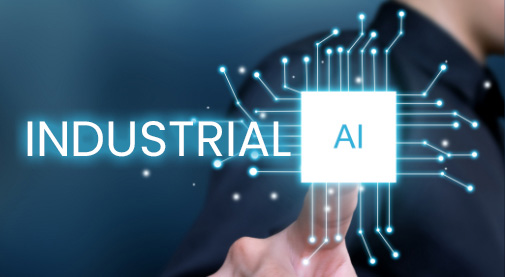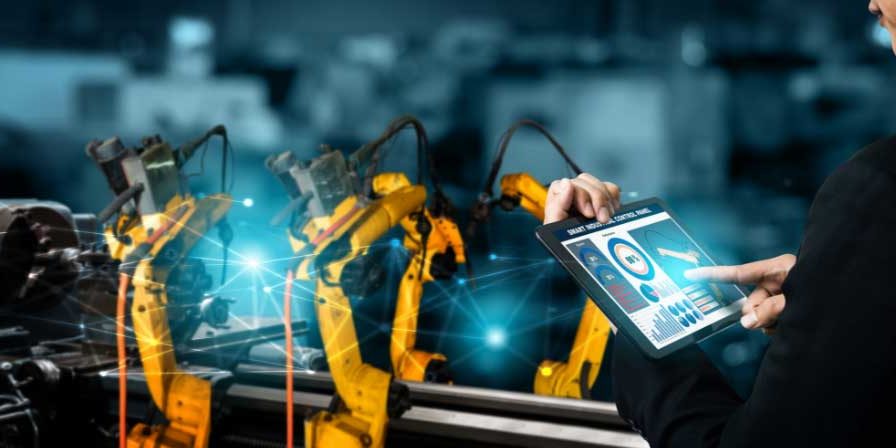Deciphering the Subject Through the Market Lens
Let’s check what the market loads you with when it comes to Artificial Intelligence in the Manufacturing Sector! Being valued at USD 1.1 billion in 2020, AI in the manufacturing market is bound to meet USD 16.7 billion by the end of 2026. This mounts to the sober growth of the market at a CAGR of 57.2% during the forecast period.
When had a close look, it could be witnessed that the rise in the adoption of AI-based technology in the manufacturing sector owes to the advent of the Industrial Internet of Things (IIoT)
IIoT enables manufacturers with real-time information for both the operational and business systems. It does this by providing for industrial processes that are efficient, productive, and innovative. This collected data fetched by IoT requires conversion into logical instructions that would further guide the industrial machines to undertake specific tasks. Furthermore, these AI systems’ instructions strive to learn human behavior through aspects like deep learning, natural language processing, and others. The AI-driven methods assume less amount of time while also working constantly without errors and glitches. Resultantly elevating the manufacturing efficiency to stir business growth.
The Compelling Force Behind & What it Endows
Now we do know what the AI-focused Manufacturing Industry looks like. But it’s also essential to find the driving force that compels the Manufacturing sector to seriously adopt AI technology. Here are mentioned a few aspects that act as a critical factor:
- Risk of high revenue fluctuation
- Need for shorter production times
- Never-satiating requirement for cost-optimization
- Escalated frequency of regulations and inspections
- Elevated exigency for small-batch or customized goods
- Demand for continued training and adaptability on the factory floor
These factors ultimately lead the factories to adopt the AI technology and finally lock the valuable benefits like as mentioned below:
- Defects detection, completely and amid the production process
- Cost-reduction and efficient customization for single-run goods
- Downtime reduction through Predictive Maintenance deployment
- Complex goods validation, like if microchips are entirely produced
- Address the real-time and in-demand changes across the supply chain
These are not all; the benefits of AI in the manufacturing sector roll-on ceaselessly pertaining to the increased and rightful use of AI technology in different manufacturing facets. Check out a few of the use-cases that the AI has to offer to the manufacturing domain and gain better clarity on the subject…
The Instances of AI applications in the Manufacturing Domain

Artificial Intelligence has already remodeled the Manufacturing setup in numerous ways, thanks to its capability in performing quality control, design-time optimization, materials waste mitigation, and more. Let’s have a glance at a few of the use cases of artificial intelligence for manufacturers.
-
Failure Mode Prediction
AI plays a crucial role in predicting the failure modes of any product. There may be products that would be prone to failure despite visual inspections. With the aid of a huge amount of data on the ways products are tested, and how they perform, artificial intelligence can locate and address the areas that would require more attention in tests.
-
Quality Control and Checks
Artificial Intelligence as technology can aid in an automated visual inspection that facilitates microscopic flaws detection in products, apart from marking them and sending useful alerts. This further helps the manufacturing sector to observe the effects on the production line while also effectively spotting any imperfections. Hence, allowing for adequate Quality Control and Checks.
-
Robotics
The conventional robots were already a part of the manufacturing domain, and now the AI-driven robots have also taken over the matter. Being capable of interpreting CAD models, the AI-powered robots can quickly eliminate the requirement to program the varied movements and processes and yet they would effectively carry out the manufacturing jobs in the industrial setup.
There are a sprawling range of use cases in the series including price forecasting, digital twins, predictive maintenance, and more. These use cases rightly and clearly display that how and in what sense the AI is empowering the manufacturing sector.
The Final Lines
What’s the final call!? Well, it could be reasonably known by the above that AI serves a tremendous purpose to the manufacturing sector. The recently occurred global pandemic that brought large-scale lockdowns, labor shortage, and supply chain disruptions witnessed Artificial Intelligence empowering the manufacturing industry. This was because the AI-driven solutions helped manufacturers digitally remodel operations like autonomous material movement using the industrial robot, undertake prompt data-based decisions, and more. Besides the adoption, AI can play a crucial role in automating several manufacturing phases, thereby also limiting the human involvement. Teksun Inc assists you with the AI edge when it comes to manufacturing. Find out what services and solutions we have to offer in the provided domain:https://teksun.com/



